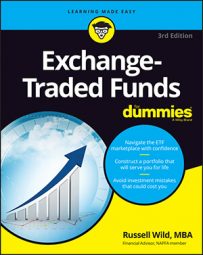After your account is in place, which should take only a few days, you’re ready to buy your first exchange-traded fund (ETF). Most brokerage houses give you a choice: Call in your order, or do it yourself online.
Calling is typically much more expensive, as it requires the direct assistance of an actual person. Being the savvy investor that you are, you’re not going to throw money away, so place all your orders online! If you need help, a representative of the brokerage house will walk you through the process step-by-step — for free!
Keep in mind when trading ETFs that the trading fees charged by the brokerage, although usually not all that much, can nibble seriously into your holdings.
Even if you work with a brokerage house that waives charges for trading particular ETFs, there will still be a small cost called the spread that you don’t readily see. The spread is where you may lose a penny or two to middlemen working behind the scenes of each trade. Spreads can nibble at your portfolio just as the more visible fees do. Here’s how to avoid getting nibbled:
Don’t trade often. Buy and hold, more or less. Although a number of headlines since 2008 have declared that “buy and hold is dead,” that’s nonsense. Don’t believe it. “Buy and hold,” by the way, doesn’t mean you never trade. But if you’re making more than a few trades every few months, that’s too much.
Know your percentages. In general, don’t bother with ETFs if the trade is going to cost you anything more than one-half of one percent. In other words, if making the trade is going to cost you $8 (an average amount for an online trade), you want to invest at least $1,600 at a pop.
If you have only $1,000 to invest, or less, you are often better off purchasing a no-load mutual fund, preferably an index fund, or waiting until you’ve accumulated enough cash to make a larger investment.
Alternatively, you might choose a no-commission ETF, even if it’s slightly less attractive than the ETF you’d have to pay a commission for. You may swap for the better alternative down the road, especially if you are funding a retirement account where swapping will have no tax consequences.
Be a savvy shopper. Keep the cost of your individual trades to a minimum by shopping brokerage houses for the lowest fees, placing all your orders online, and arguing for the best deals. Yes, you can often negotiate with these people for better deals, especially if you have substantial bucks.
Also know that many brokerage houses offer special incentives for new clients: Move more than $100,000 in assets and get your first 50 trades for free, or that sort of thing. Always ask.

